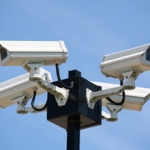The great thing about wireless CCTV cameras is that they’re easy to install. This is for the obvious reason that they don’t need as many cables as wired CCTV cameras. But not so fast, these kinds of cameras do need a power cable, so you would need a power outlet nearby. However, there is the option of getting a battery operated wireless CCTV camera, this is a truly wireless CCTV camera.
Wireless CCTV cameras usually come paired with a receiver.
A receiver is a device which captures the signal which the camera sends out. The receiver then links to a storage device, like a PC or a digital video recorder (DVR), which stores the cameras footage. But, wireless security cameras do have weaknesses. The problem lies with the fact that household appliances like microwaves, air conditioners and even fluorescent lighting interfere with the cameras signal. Also there is the small issue of line of sight. Wireless cameras function best when there is direct line of sight between the camera and receiver. But this is not a hard and fast rule, and most of these security cameras do still operate even when there is no line of sight. It’s just that obstacles, like walls, will reduce the camera and receivers range, especially when the obstacle is made of metal.
Wireless CCTV cameras systems afford you two options with regards to types of cameras – analogue or digital. Your digital cameras are by far the more technologically advanced. Typically, a digital security camera will have its signal converted into digital packets and these will, down the road, be sent to a recording device.
Due to the fact that digital cameras are based on a digitised signal, it means that you can send information to the camera, which means you can tell the camera to perform various functions, like telling it to turn lights on or off. Another advantage about digital cameras is that they don’t suffer from the problem of their signal being interfered with by other appliances. These kinds of advantages come at a price, so if you’re looking to save a buck then rather opt for the analogue.


